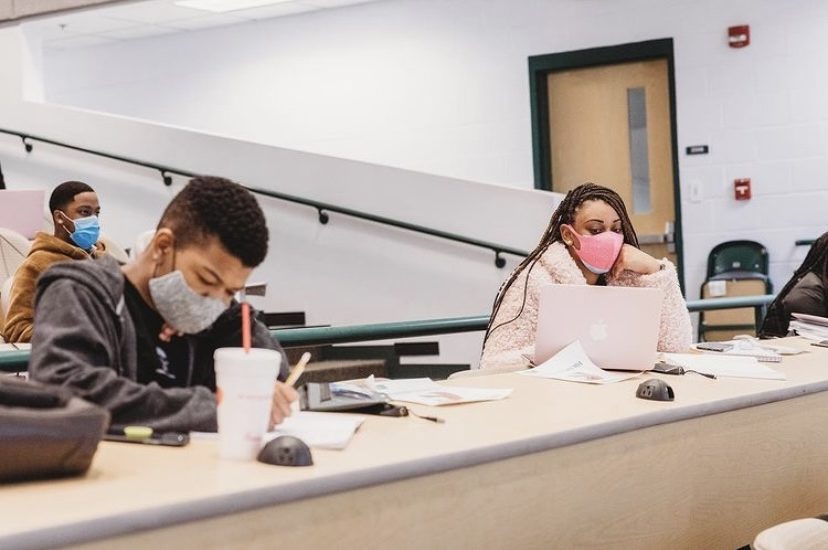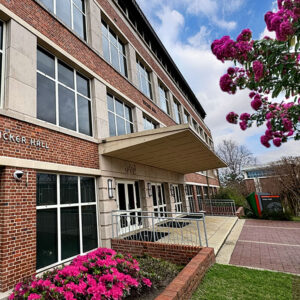Campus Life | March 4th, 2021
SJGC Students Feel Unsafe Learning On-campus
By: Shadell Bromell

Every Thursday night, Joanne Jean sets her alarm for 6 a.m. the next day. At the crack of dawn, she jumpstarts her morning with a fresh shower and skin regimen. Next, Jean raids her closet for the perfect business casual fit. Before jetting out the door, she grabs a bite of food to satisfy her for the rest of the day. This may just be the only time she’s able to eat. It’ll be nearly 10 hours before Jean returns home. Fridays, for Jean, aren’t the regular 9-5 workday. It’s the day she’s required to attend an in-person class at FAMU’s School of Journalism and Graphic Communications building.
Tuesday, March 2, the SJGC building closed temporarily due to a positive COVID-19 testing staff. This is the second time in less than a month SJGC was forced to shut down and sanitize. Each time, the school reopened for learning only a couple of days later. SJGC students like Jean are concerned for their safety while learning on campus.
“Two days,” Jean, who has to return to the building on Friday, said. “ I don’t know if that’s enough to clean an entire college of COVID-19.”
Jean, a senior journalism student from Broward County, is enrolled in Advanced TV News. The class teaches her the fundamentals of working with a live newscast. Advanced TV News is scheduled three days out of the week for Jean. Mondays and Wednesdays are her hour-long lecture periods. While Fridays are spent in an eight-hour lab as an associate producer for News 20. She’s required to report to school each of these days.
Hybrid Flexible (Hyflex) was a learning option given to students at the beginning of this semester. According to the FAMU site, Hyflex is “a course design in which students meet in-person and attend remotely on specific days.”
However, Jean wasn’t offered Hyflex for Advanced TV News and doesn’t feel the need to be in class on her lecture days as it compromises her wellbeing. Jean said she didn’t feel safe after SJGC’s first COVID-19 scare. When returning to classes, she recalled being wary of touching certain surfaces. Jean wasn’t sure how clean the building was, having been exposed to the virus only 48 hours before.
As of late, there have been no official comments from interim Dean Bettye Grable to students. Journey has reached out to Tanya Tatum, Director of Human Health Services and Rica Calhoun, Chief Compliance and Ethics Officer, for comment.
Although the Center for Disease Control states, the virus naturally dies within hours or days upon surfaces and objects, Jean wondered if it were a possibility the school’s sanitation missed any corners.
“This is all very new for everyone,” Jean said. “There needs to be a stricter protocol on testing and monitoring students and staff.”
The FAMU COVID-19 Dashboard reports self-submitted positive test results of students, faculty and staff. In February, 12 employees submitted their positive cases. Therefore in a little over a month, SJGC accounted for 15 percent of all employees infected with the coronavirus.
According to the FAMU Re-Opening: Operational Plan, as of Aug. 2020, up to 75% of employees returned to the workplace.
“I honestly do not feel safe being in SJGC”, Jayla Swinson, a senior journalism student from Jacksonville, Fla., said.
Swinson has classes in the building four days out of the week. She’s also enrolled in Advanced TV News and Specialized Reporting. Swinson said upon receiving the news, she immediately felt unsafe because she’s around students and faculty all the time. She didn’t know which individual tested positive and who else they came in contact with.
Furthermore, The FAMUINFO email students received Tuesday didn’t help answer these questions. The email stated:
“The School of Journalism and Graphic Communication will be closed until 8 a.m., Thursday, March 4, for sanitization. Employees and students should avoid entering these areas during sanitization.
Faculty and students with courses scheduled in the School of Journalism and Graphic Communication should have classes remotely tomorrow, March 3.”
The vague message gave no more insight as to who tested positive, when they tested positive and who may have been exposed. Before the email, many professors were already notified having sent class cancellation announcements on Canvas. One professor also revealed the positive case was an employee.
“I believe we should transition to all lectures being virtual and only come to campus for the newscast,” Swinson said.
While FAMU flaunts its efforts to prevent the spread of the virus through student COVID-19 training and “Coping with Covid” webinars, students at SJGC believe the alarming cases are proof that coronavirus is more than just an engagement activity.






